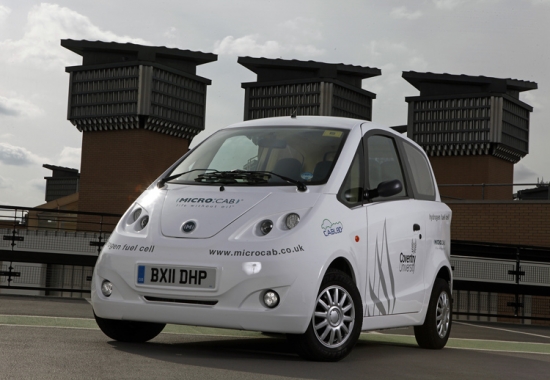A way to introduce the hydrogen as the fuel of the future
Fleet operators will be able to experience hydrogen fuel-celled driving at this year’s Fleet News Company Car in Action, the industry’s biggest event where vehicle manufacturers demonstrate their latest products to more than 1,000 key company car decision-makers.
The brainchild of Professor John Jostins, also managing director of Microcab, the H2EV will provide fleet operators with what is likely to be their first opportunity to drive a hydrogen fuel-celled vehicle or FC car, the most environmentally friendly vehicle ever developed since its only by-product is water.
Microcab will provide a vehicle to drive and a static display at the event, which this year celebrates its 21st birthday, at Millbrook Proving Ground from 11-12 June 2013. Experts from Coventry University, a Microcab shareholder and where Professor Jostins is based, and the University of Birmingham, whose scientists have also worked closely on the project particularly during its driving trials, will be on hand to answer questions.
Jostins believes fleets will have a vital role to play in helping establish the gas as the fuel of the future. He also thinks early adoption among fleets will promote a wider acceptance of these vehicles which, in turn will help to secure future business and manufacturing in the UK thus making Microcab’s appearance at the event potentially even more pivotal.
“Fleet operators are key influencers and we consider it very important to have their backing in order for hydrogen powered vehicles to gain ground,” said Jostins. “Not surprisingly, the hydrogen hotspots are California, Germany, Japan and Scandinavia. I am keen the UK keeps up with the nations who are already out in front so we have a stake in its development to ensure we secure UK jobs for the entire process from the production and maintenance of the vehicles to building the infrastructure.”
Whilst the infrastructure has yet to be built, refuelling at a hydrogen pump is much the same as conventional diesel or petrol. There is a handful in the UK, including on the University of Birmingham campus and at some bus depots where the fuel is already being utilised. It is predicted that 65 refuelling stations will be available in major population centres by 2015.
The compact four-seater, built on a Lotus chassis, has been designed as a city car or urban compact cab which has a maximum speed of 55mph. Hydrogen is measured in kilos rather than litres and one kilo of hydrogen is equivalent to a 2/3 gallon (3 litres) of petrol. One kilo of hydrogen delivers a range of approximately 65 miles for the Microcab vehicle.


